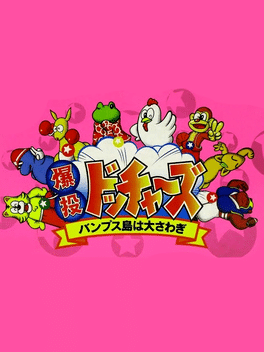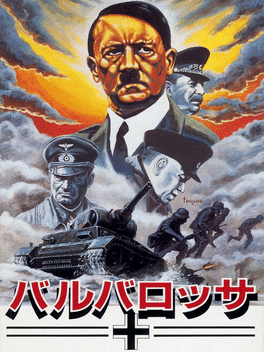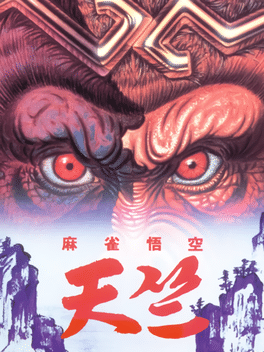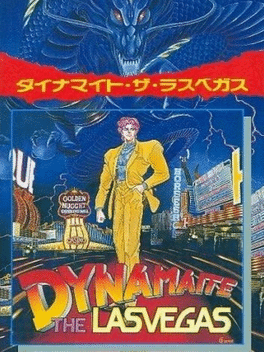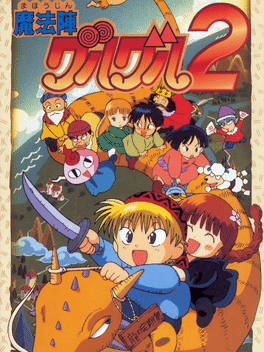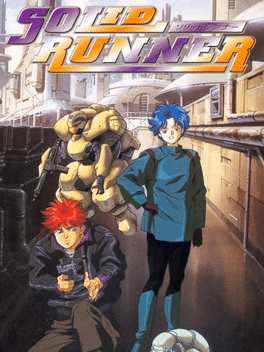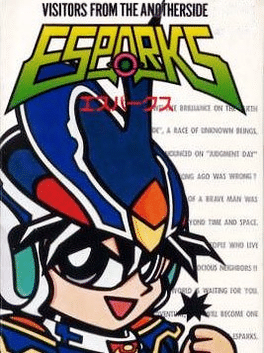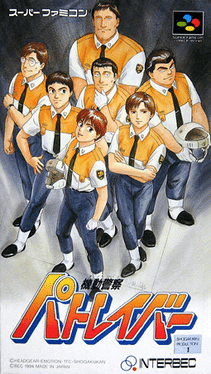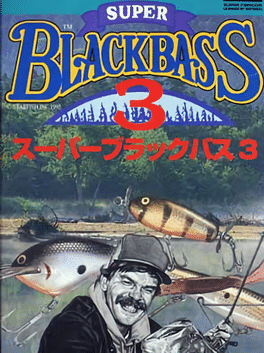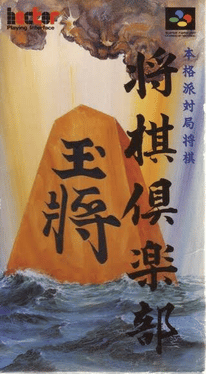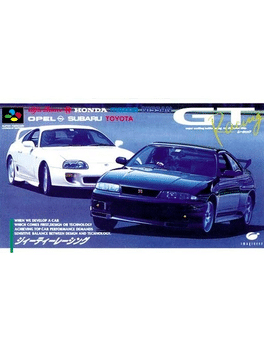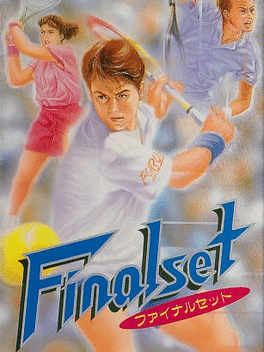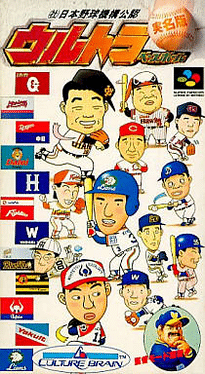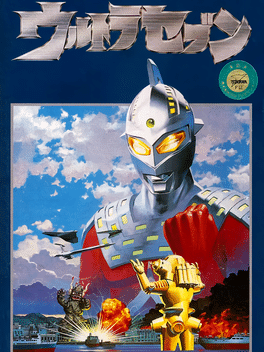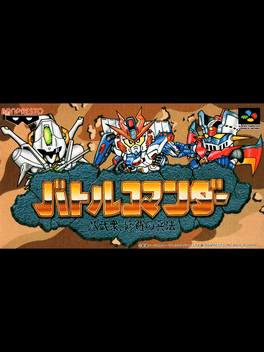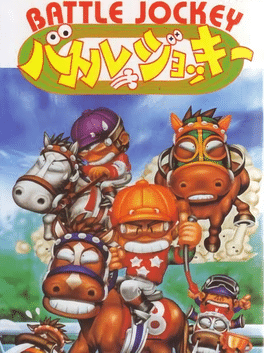Most Popular Super Famicom Games - Page 12
-
Bakutou Dochers: Bumps-jima ha Oosawagi
1994
Bakutou Dochers is a Japan-only action game for up to four players. It superficially resembles Hudson's Bomberman series, with its top-down grid stages and chaotic gameplay, but rather than leaving bombs and waiting for them to explode, the player can shoot energy at blocks and each other. The goal is to sneak up behind the opponent and shoot them before they can reciprocate. Various power-ups may appear after destructible blocks are removed, which can give the player an edge or, in the case of the ? icon, a possible random negative effect like reversed controls. There are also wandering monsters that can cause damage to anyone they come in contact with. Every combatant has a health bar which depletes at a rate dependent on the attacks they are getting hit by. The single-player mode involves fighting through various worlds and removing all enemy combatants from the field to progress. -
Barbarossa
1992
Barbarossa
1992
Strategy game based on WWII barbarossa campaign. Operation Barbarossa (German: Unternehmen Barbarossa) was the code name for Nazi Germany's invasion of the Soviet Union during World War II, which began on 22 June 1941. The operation was driven by Adolf Hitler's ideological desire to conquer the Soviet territories as outlined in his 1925 manifesto Mein Kampf ("My Struggle"). In the two years leading up to the invasion, the two countries signed political and economic pacts for strategic purposes. Still, on 18 December 1940, Hitler authorized an invasion of the Soviet Union for a start date of 15 May 1941, but this was not met; instead, the invasion began on 22 June 1941. Over the course of the operation, about four million soldiers of the Axis powers invaded the Soviet Union along a 2,900-kilometer (1,800 mi) front, the largest invasion force in the history of warfare. In addition to troops, the Germans employed some 600,000 motor vehicles and between 600–700,000 horses. It marked the beginning of the rapid escalat -
U.F.O. Kamen Yakisoban: Kettler no Kuroi Inbou
1994
U.F.O. Kamen Yakisoban: Kettler no Kuroi Inbou ("U.F.O. Kamen Yakisoban: Kettler's Black Conspiracy") is a brawler featuring U.F.O. Kamen Yakisoban, a character designed to market Nissin's Yakisoba U.F.O. brand of instant yakisoba circa 1993-1995. It understandably features a variety of foodstuffs. In the game, Yakisoban's bride-to-be Mayumi has been kidnapped by the villainous Kettler who wishes to marry her himself (and of course to destroy the concept of delicious Nissin Brand instant Yakisoba!). Yakisoban is obviously a bit dense, as he's standing at the altar and doesn't even realize Mayumi is not there until part-way through the ceremony. -
Mahjong Gokuu Tenjiku
1994
Mahjong Gokuu Tenjiku is a Miscellaneous game, developed and published by Chat Noir, which was released in Japan in 1994. -
Dynamaite the Las Vegas
1994
A 1994 casino gambling game for the Super Famicom. The stylish Mr. Dynamite must defeat the Las Vegas Dragon by making a lot of money at the craps tables. -
Mahoujin Guru-guru 2
1996
Mahoujin Guru-guru 2
1996
Mahoujin GuruGuru 2 is a Role-Playing game, published by Enix Corporation, which was released in Japan in 1996. -
Hi no Ouji: Yamato Takeru
1995
An RPG loosely based on the exploits of Prince Ousu, the titular Yamato Takeru ("The Brave of Yamato"). -
Solid Runner
1997
Solid Runner
1997
Solid Runner (ソリッドランナー) is a 1997 turn-based role-playing video game developed by Sting Entertainment and published by ASCII Corporation for the Super Famicom. The game was released exclusively in Japan on March 28, 1997, late in the console's life span. The game takes place in a town known as Solid City, which despite being technologically advanced, is overrun with crime. Very few people dare to challenge the control of the underground mafias and street gangs that threaten the city. While the game has a continuous plot, players are urged to complete individual missions. -
Kidou Keisatsu Patlabor
1994
One of the several games based on the anime and manga Patlabor. In this role-playing game the player controls two main pilots from the series, Noa Izumi and Isao Ota, as they complete their typical duties each day, helping to deal with rogue Labors (Mecha) and other such incidents. The gameplay consists of three modes - a map of Japan, showing where assignments are located, the "main" screen, where the player controls the Labor from a top-down viewpoint and maneuvers it around the area of the crime, and the combat screen, for when you press the action button to attack a rogue Labor. From here it is possible to select one of various attacks; naturally, as the game goes on the pilots can learn new attacks. Unusually for an RPG there is also the option to just talk with the rogue Labor's pilot and try to convince them to back down - as a policeman, sometimes this is the only way forward. -
Super Black Bass 3
1998
Super Black Bass 3
1998
Part of the Black Bass series of fishing games by Starfish, and their third title for the SNES. Unlike the previous two Super Black Bass games, however, this one was not released outside of Japan. -
Honkakuha Taikyoku Shogi: Shogi Club
1995
Honkakuha Taikyoku Shogi: Shogi Club is a Miscellaneous game, developed by Natsu System and published by Hect, which was released in Japan in 1995. -
GT Racing
1996
GT Racing
1996
GT Racing is a Super Famicom racing video game where the player gets to drive a Gran Turismo car in either championship or practice mode. The game is based on the 1996 Super GT racing season using the horsepower standards and rules of the era. During championship mode, the player is asked enter a number, his or her driver's name, and the team name that he or she will use during the championship. The driver's name and team can be entered using either English or Japanese letters. When a player beats a record, he or she is asked to insert his or her number, name or initials (up to four characters and two digits for the number). Championship mode can last for multiple seasons. Playing ninety-nine seasons in a single racing career is theoretically possible due to the double-digit nature of the season information. There are eight different tracks, including the Suzuka Circuit that has been shown in video games since Pole Position II and Fuji Speedway (complete with a virtually photorealistic Mount Fuji in the background -
Super Power League 4
1996
Super Power League 4
1996
Super Power League 4 is a Sports game, developed by Now Production and published by Hudson, which was released in Japan in 1996. -
Final Set
1993
Final Set
1993
Final Set is a tennis game for the Super Famicom, created by Open System and Forum; a duo which would only go on to create one other game: Super Indy Champ, also for the Super Famicom. Final Set uses photos of actual people for its various playable tennis characters, and digitized actors as the athletes. The game has options for singles and doubles, allowing for up to four human players in doubles mode. There's also a World mode that allows the player to create their own tennis player, and build up stats by defeating other tennis players across the world. -
Ultra Baseball Jitsumei-ban
1992
Ultra Baseball Jitsumei-ban is a baseball simulator from Culture Brain and part of their Ultra Baseball series of games, which take a slightly more surreal route than other baseball franchises by giving players special abilities to use. The first two games in the series are better known in the US as Baseball Simulator 1.000 and Super Baseball Simulator 1.000. Jitsumeiban means "Real Player Version", due to the game being officially licensed by Nippon Professional Baseball, which allowed them to use actual team and player names. There would eventually be two more Ultra Baseball Jitsumeiban games for the Super Famicom, released in 1994 and 1995. -
Ultra Seven
1993
Ultra Seven
1993
Ultra Seven is a 2D one-on-one fighting game that uses characters from the tokusatsu TV show of the same name. The Ultra Seven series is based on the original Ultraman TV show, but updated for a modern audience with a different protagonist who hails from the same planet as Ultraman. Ultra Seven features a single-player story mode in which the player can sometimes choose which of Ultra Seven's capsule monsters (Agira, Micras or Windom) to fight as, and a versus mode in which two players can duke it out. -
Ugoku E Ver. 2.0: Aryol
1994
Ugoku E Ver. 2.0: Aryol is a Puzzle game with a Russian motif, published by Altron, which was released in Japan in 1994. -
Battle Commander: Hachibushu Shura no Heihou
1991
Battle Commander is a Strategy game, developed by Arc System Works and published by Banpresto, which was released in Japan in 1991. -
Battle Jockey
1994
Battle Jockey
1994
Battle Jockey is a horse racing video game for the Super Famicom, published by Virgin Interactive, which was released exclusively in Japan in 1994.
